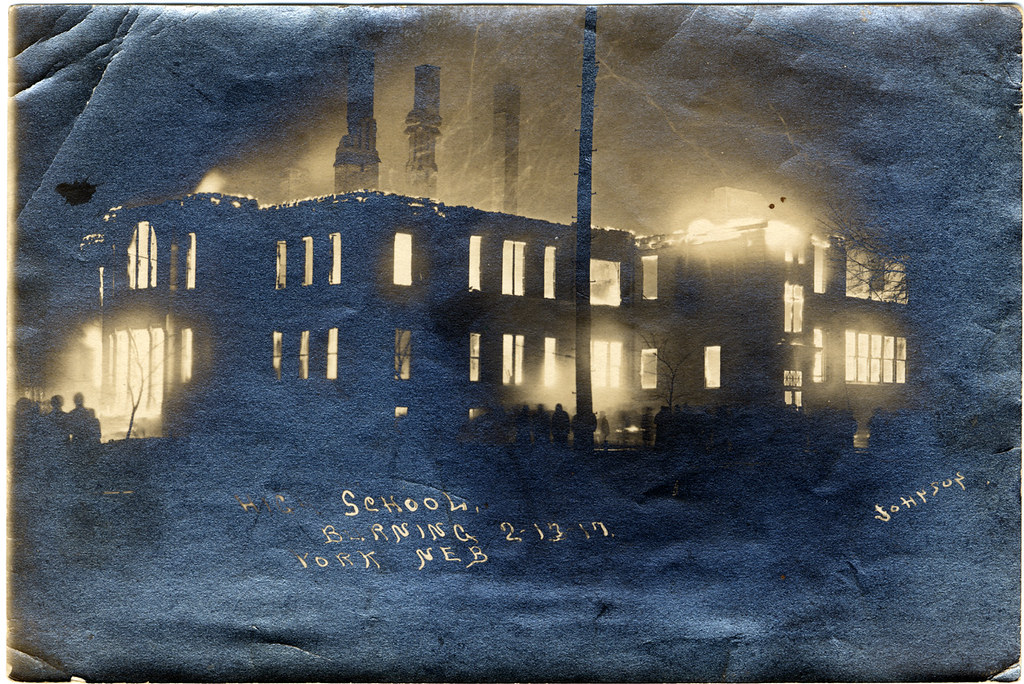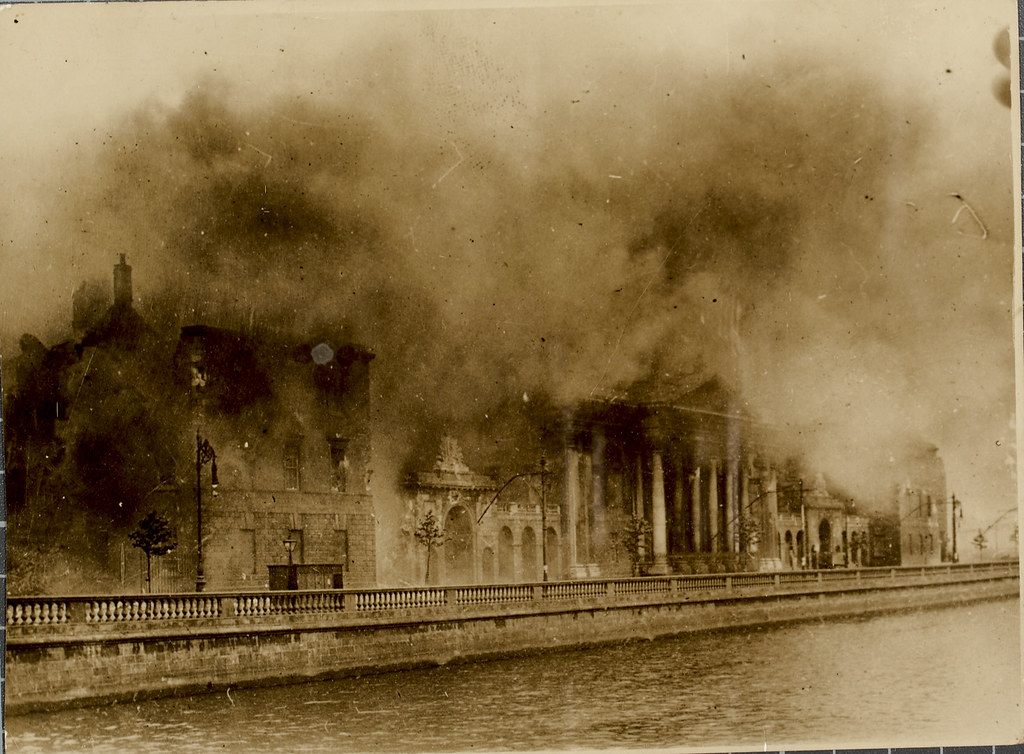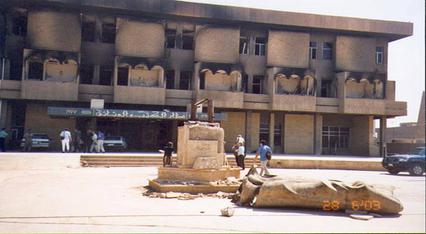.

Central High School Fire, York, Nebraska. Onlookers and window outlines in silhouette: photo by Johnson, 13 February 1917; image by yorklib (Kilgore Memorial Library, York, Nebraska), 7 March 2012
On
the night of the library fire all the data went up in smoke and when
the backup systems then failed too all the information about how
everything works was lost
Birmingham (UK) Library fire, 1879. [Mason Science College visible through the wreck of the original Birmingham Central Free Library, burned down in 1879]: photographer unknown; image by Rich Farmbrough, 14 July 2005 (Birmingham City Council)

Interior of the Famous Library at Louvain [Library of the Catholic University of Leuven, set ablaze by German occupying forces as part of the burning of the entire city in an attempt to quell Belgian resistance, 25 August 1914]: photo by N. J. Boon, in The New York Times Current History: The European War, February 1915; image by William Avery, 2 July 2006

The Library of Congress, Washington, D.C., destroyed during the War of 1812 when British troops set fire to the US Capitol during the burning of Washington: drawing for Capture and burning of Washington by the British, 1876 (Library of Congress)
Iraq
National Library and Archive, Baghdad, one of several libraries in Iraq
looted, set on fire, damaged and destroyed in various degrees during
the 2003 Iraq war: photographer unknown. 28 June 2003 (Iraq National Library and Archive)


Ragnal
Library, Ragnal Castle, Wales. The Earl of Worcester's Library, burnt
during the English Civil War by Parliamentary forces under the command
of Thomas Fairfax, 1642: photo by Hchc2009, April 2011
A
cello player in the partially ruined National and University Library of
Bosnia and Herzegovina, destroyed by Bosnian Serb shellfire during the
siege of Sarajevo, 17 May 1992: photo by Mikhail Estafiev, 28 September 2005
Remains of the National Library of Serbia, Belgrade, destroyed in bombardment by Nazi German Luftwaffe, 6 April 1941: photo by Orjen, 23 November 2008

Conflagration. The Four Courts in Dublin during the Battle of Dublin. The building
had been taken over by Anti-Treaty forces on 14 April 1922. Bombarded
by National Army forces on 28 and 29 June, a huge explosion of stored
munitions on 30 June destroyed the Public Records Office, and with it
a huge swathe of Irish cultural memory. [Origin of fire now disputed. Possibly set
deliberately by Anti-Treaty IRA; or possibly by accidental ignition of
their stored explosives due to shelling by Provisional Government
forces.]: photographer unknown, 30 June 1922 (National Library of Ireland)







12 comments:
And, in our time, neo-librarians chose computers over books and magazine subscriptions... wrecking our libraries... the lousy sonsabitches.
As they worked toward the All New Library of Birmingham, thousands of books were sold off or destroyed. They made sure they kept that one stumm. Protests from staff went unheard.
The skeletal remains of the Victorian Free Library seems nothing when set against that calculated destruction.
Red's spot on.
This trust in the virtual cloud full of zeros and ones will be our undoing, backup systems or no.
Destruction of a library, no matter how distant from us, feels like destruction of our own home. Books are our other limbs and organs even in languages we don't speak.
-David
The element of sheer human laziness and inattention driving the conversion of libraries from places where books are held to places where computer terminals may be accessed became clearly evident to us when the local branch library was torn down and replaced at taxpayer expense by a much grander operation with no addition to the stock of actual books but new and more prominently-displayed computer "stations", new bathrooms, new offices for staff, and all functions mechanized so that the increasingly redundant librarians are permitted to stare off into space and think about lunch, or possibly their benefits package.
With the proliferation of the handheld plastic idiot slabs that have replaced all imagination and thought and serve merely as repeating devices, iterating their own limited function over and over, it becomes more and more apparent that the decline of the species is well underway.
I'm finding of late that within a second or two of my putting up a post certain malign agencies with names out of Bela Lugosi movies are dropping in (via bot of course -- talking of the redundancy of humans) to snatch it away so that the "content" (words, images, the total package as posted but sans any attribution, naturally) may be harvested for re-use elsewhere... in fact, in god only knows how many idiot elsewheres.
Not that it's not fun to have a phantom presence on Yandex, but still.
This indicates to me that with the gradual attrition of the ability of the human imagination to produce original "content", the famous Cloud, by the time it actually bursts and evaporates like the great Nothing it always was, will contain, in fact, just that -- a whole lot of Nothing.
That ought to soften the blow, at least.
(And the new bathrooms are much more spacious than the old, the new staff offices private and of course larger than the old, and so on... these so-what-else-is-new details courtesy of our trusty library scout, who's strictly old-school, that is, only in it for the read...)
These images are unbelievable. Poet Red Shuttleworth's comment brings to mind some things I learned at my daughter's school on Thursday, during the dreaded annual fall "academic evening," where you meet her teachers and they're each given about 10 minutes to say something reasonably informative about the year ahead. In short, I think it portends poorly. The school seems to be in full flight from books and paper, substituting instead online resources and communication and more keyboard and smart-board animation and fiddling. As literacy levels inevitably decline, learning actual facts appears to be universally derided; instead they're skipping straight to "meaning" via "close reading" of text fragments separated from the larger works they were originally embedded in. In Jane's case, this means she will emerge from high school at the end of 2015 without actually having studied American history in detail. She will supposedly be familiar with aspects of the Federalist Papers, without having studied the facts of the American Revolution, and with the depredations of slavery through first-person accounts without knowing anything concrete and synoptic about the Civil War. We were told that if she decides to take the SAT 2 in history, she needs to buy a "fact textbook" and cram. Incidentally, she attends what is considered to be the best girls private school in Philadelphia aka the "Cradle of Liberty." Oh -- the school has just purchased (at great expense) a user license for a piece of sophisticated anti-plagiarism software, which I suppose saves teachers time for other tasks than carefully reading and considering students' work and inculcates entire areas of new student thinking about the honor code and learning. Curtis
Literacy -- wasn't that rescinded four score and seven years ago?
"Idiot slabs." I just noticed that -- what a great expression. During August, when Jane was being tutored for a couple of advanced placement exams she wanted to take, I spent a lot of happy time in the newly renovated Ludington Library in Bryn Mawr, PA. It was gratifying to see that they'd actually rebuilt and expanded the place as a circulating library devoted to books and readers, rather than as a computer terminal terminus. Still, I'll never forget an experience I had several years ago in the Swarthmore College library, which is a much poorer and uglier place now than when I was a student (the Friends Historical Library section excepted; I don't think I've ever seen a Swarthmore student in there, however). Entering the main library one day, I was shocked to see that the card catalogues had been removed and replaced by computer terminals. I died a little that moment. A very pleasant young man explained to me the advantage of the new system, which mainly consisted of being able to determine from the terminal whether the book you were seeking was currently on the shelf, i.e., not checked out or otherwise missing. He really believed in the reliabilty of the system and it made me sad to tell him that I was pretty certain that I could disprove it instantly, which I did. I used to shelve books when I was in college. My work habits have improved considerably since then. I figured, however, that the library still employed my contemporary "equivalents." Curtis
Tom,
"all the information about how everything works . . . lost."
"the decline of the species . . . well underway"
"she needs to buy a 'fact textbook' and cram."
Speaking of which, Curtis, yesterday's Times had a piece about E.D. Hirsch, whose "Cultural Literacy" seems to be enjoying a renaissance of attention these days. According to the Times, "what made it ["Cultural Literacy"] famous was the appendix, known as “The List,” whose 5,000 facts, names and concepts . . . read like an index to human history and culture."
if anyone's interested, here's the link -- http://www.nytimes.com/2013/09/28/books/e-d-hirsch-sees-his-education-theories-taking-hold.html
Steve -- Thank you for this. I will definitely check it out. Curtis
Thanks Curtis, I've never seen the book (or its 'facts'), wonder what you'll find. . . Steve
Post a Comment